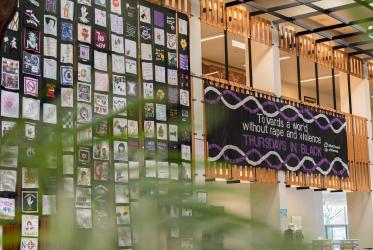This is the fourth in a series of interviews with Thursdays in Black ambassadors who are playing a vital role in increasing the impact of our collective call for a world without rape and violence.
Larissa Aguiar Garcia, from Igreja Medista do Brasil, is a member of the World Council of Churches (WCC) ECHOS Commission for young people.
How did you get involved with Thursdays in Black?
Ms Garcia: My family has always been active in church; in doing so we had a lot of contact with other religious spaces and got to know the campaign. It resonated with me, as I saw the news, heard the nightmarish tales from other women and experienced violence myself - the way it comes in different ways and from different people. Supporting a campaign that goes against violence, specifically gender-based, was the minimum I could do.
When the WCC relaunched Thursdays in Black in 2018, I bridged the information to the Brazilian Methodist women’s confederation, reporting what I learned and bringing the material produced by the WCC, then we translated the material to Portuguese and distributed it in the national women's assembly.
Lately we are encouraging those participating in the campaign to share photos of themselves wearing black with both tags - the one we made in Portuguese (#quintafeiradepreto) and the official one from WCC.
How is it taken up in your church?
Ms Garcia: For the last few years, mostly the older women in the church actively participated in it. Recently the young women began to take part in it as well, as a result of the new identity and relaunched campaign.
Gender issues and violence are often addressed within the church, especially around times when acts of it reach the news, and people are sensitized about how gender violence affects the lives of countless women. As a church, we support the campaign, yet our engagement can still be improved.
Have you seen any change in how people approach gender or violence issues?
Ms Garcia: I’ve been wearing black every Thursday for the last three years. The first change I saw was in myself. Thursdays became a day to pray for social and gender justice, as well as praying for resilience.
In my daily life, a lot has changed as well. At work and at the university people often ask about the campaign. More often than not, I get to explain about the campaign and gender violence to people that are privileged enough to never have known it, and thankfully most of them started to change speaking patterns and cultural norms that allow for the violence or rape. Other women also shared similar experiences of the people around them changing small but meaningful things.
Brazil still has a long way to go with regard to gender justice, especially now, with the current government allowing violence to grow again, if not by its actions, by its inaction. We need to spread awareness and extend our hands in help. I believe that Thursdays in Black works towards that. We're opening a safe space to talk about what's happening, praying for those who can't speak and taking action whenever possible to help those in need.
What is your message about the first step people should take?
Ms Garcia: As Christians, our first step should always be prayer. Pray for those who are suffering from gender violence and its aftermath. Pray for those who work with social support and doctors who are the first line of help. Pray for those who can help to perceive where and who are those that need it.
And if you're one of these people, pray for enlightenment and courage to do what has to be done. If you're one of the people who need help, pray for resilience, faith and strength. Then find a black piece of clothing and start wearing it every Thursday. The cloth will not perform miracles, but our prayers and attitudes should.
To learn more about Thursdays in Black ambassadors, please contact [email protected].
Thursdays in Black Ambassadors
“Ambassadors” lead Thursdays in Black Solidarity (WCC Press release of 5 September 2019)









